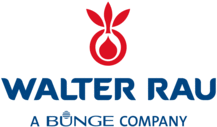Contact
41460 Neuss
Production steps

Individual products
By selection of appropriate raw materials and the sensible use of modern technologies we produce functional and healthy vegetable fats and oils for your individual requirements.
At first the raw oils have to pass through a thorough purification process – the refining. Classically the refining process consists of the steps neutralization, bleaching and deodorization. Additionally we are able to tailor fats and oils to customers’ needs by using different modification methods.
In their liquid form our products are loaded into road tankers or containers. We are also able to pre-crystallise fats and oils so that they can be packed into boxes with a range between 7.5 kg and 25 kg, or into buckets
Neutralization
After harvest and during storage and transport, free fatty acids are formed in the oil. These can have negative effects on the nutritional, functional and organoleptic properties. That’s why those components have to be removed during neutralization.
The free fatty acids can be removed either on a chemical way by the neutralization with caustic soda or on a physical way (by distillation). During neutralization caustic soda converts the free fatty acids into water-soluble sodium salts which can be removed with the help of centrifugal separators.
Bleaching
The aim of the bleaching process is not only to remove the colouring compounds, but also to eliminate other minor impurities like heavy metal particles. These components have a direct effect on the oxidative stability. That means that they start or speed up degradation processes.
The bleaching is based on adsorbtion: bleaching earth is added to the oil, which adsorbs the impurities and can be removed by filtration techniques afterwards.
Deodorisation
Deodorization is the last step in oil refining. During this process unwanted gustatory and odorous substances (mainly hydrocarbon, aldehyds, ketons, lactones and free fatty acids) are removed. These may cause off-flavours.
Deodorization bases on the principle of vacuum-steam distillation: inside the vacuum steam passes through the oil at elevated temperatures. The volatile substances are removed by steam.
The result of refining is an odourless and tasteless edible oil or fat.
Methods of Modification
With different modification methods we can “tailor” our products individually to our customers’ needs.
- By blending different kinds of oils and fats we achieve the desired fatty acid profile and / or influence the functional properties like plasticity and melting behaviour.
- A desired melting range one obtains by fractionation, too. That means that fats are split up into so called fractions by crystallization.
- In hydrogenation hydrogen is taken up by the double bonds inside the fat molecule, they become saturated. The melting point increases accordingly. By using our modern process for the hardening of fats we achieve products with a reduced proportion of the undesirable trans-fatty acids.
- It is possible to adjust melting and crystallization properties by interesterification. The fatty acid composition is not altered, but the fatty acids are rearranged in the molecule.
Packaging
For packaging into cartons or buckets the fats are being pre-crystallized with the help of a scraped surface heat exchanger (Kombinator). During this process the fats get their homogeneous consistency and the desired crystal structure.
Our products can be packed into bars or boxes with a range between 10 kg and 25 kg. Semi-solid fats are available in a 7.5 l bag in box or in buckets of 10 l.



